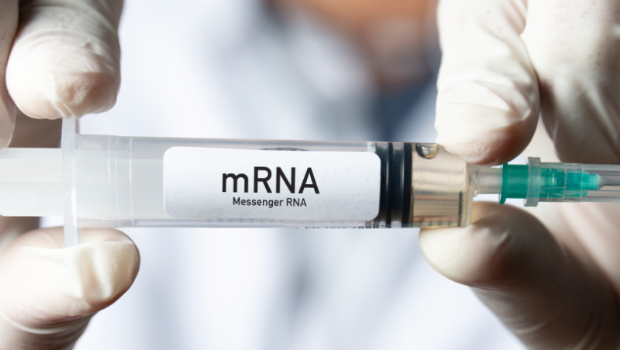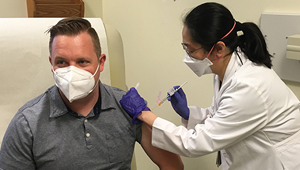Researchers begin trial for mRNA flu vaccine

The investigational vaccine is in the third phase of trials and targets flu strains expected to circulate this winter
Researchers at Kaiser Permanente Washington Health Research Institute (KPWHRI) are now recruiting participants age 65 and older who have not yet received this season’s flu vaccine for a trial of an investigational mRNA flu vaccine developed by Pfizer. The trial, taking place at many research sites across the U.S., will evaluate the vaccine's efficacy and the immune response that it generates. If the vaccine performs well, it could contribute to improved protection against flu, which still has a large health impact in the U.S. and globally.
Current flu vaccines do not use mRNA technology, and both Pfizer and Moderna are testing mRNA flu vaccine candidates, which could become the first vaccines against influenza that use this approach. Vaccines using mRNA use the genetic sequence of a virus, rather than the whole virus, and are able to be manufactured rapidly at a large scale. They are also more easily adaptable, which could make it easier to match the vaccine to circulating flu variants.
“Flu is challenging because the flu viruses change from one season to the next,” said KPWHRI Senior Investigator Lisa Jackson, MD, who is overseeing the trial at the institute. “An improved vaccine could provide stronger protection against the flu each year and reduce the number of hospitalizations and deaths.”
The impact of the flu in the U.S. varies from year to year, but the CDC (Centers for Disease Control and Prevention) estimates that, over the past decade, flu caused as many as 710,000 hospitalizations and 51,000 deaths each year. Vaccination is the best way to protect against illness and complications from the flu. The protection from current vaccines varies depending on the type of flu that is circulating and how well the vaccines are matched to the virus.
In order to manufacture vaccines in time for fall and winter, global health experts have to decide months in advance of flu season which strains are most likely to circulate. They use data from global flu surveillance, genetic sequencing of flu viruses, blood and antigen studies, and other information to choose which strains to target. When vaccines are well matched to circulating viruses, the current flu vaccine is 40% to 60% effective at reducing the risk of illness for the general population, but a poor match can result in much lower effectiveness.
The need to match the vaccine to circulating viruses means mRNA vaccines may have an advantage because of their flexibility. Since they can be manufactured quickly and at a large scale using the genetic sequence of a virus, it might be possible to manufacture new vaccines during a flu season if the ones developed beforehand turned out not to be a good match with the circulating viruses.
All current flu vaccines and the mRNA vaccine being tested are quadrivalent, meaning they target 4 different viruses: 2 influenza A viruses and 2 influenza B viruses. Early studies of the Pfizer mRNA vaccine demonstrated that the vaccine was safe, and this phase 3 study is designed to focus on how well the vaccine protects against the flu. Messenger RNA, or mRNA, is a molecule that carries instructions to cells to make a protein. In the case of mRNA vaccines, that protein prompts an immune response in the body that generates antibodies against a virus, which helps protect against illness from that virus in the future.
How to participate in the trial
Researchers at KPWHRI are looking for Kaiser Permanente members ages 65 and older who have not yet received this season's flu vaccine to participate in the trial. Participants will receive one shot of either the investigational mRNA flu vaccine or a licensed inactivated flu vaccine and will not know which vaccine they are receiving. Participants will need to visit the research clinic in downtown Seattle at least 3 times over about a 6-month period and will be asked to report any respiratory symptoms during that 6-month period to the clinic staff. Participants will receive $50 for each in-person visit.
To learn more about this study, please email KPWA.vaccine@kp.org with your full name and date of birth and the best phone number and time to reach you.
Visit ClinicalTrials.gov for additional details.
News

KPWHRI begins new phase of flu surveillance
KPWHRI receives $10 million to continue vaccine effectiveness research for flu, COVID-19, and other respiratory diseases.
Research

Researchers begin clinical trial to assess schistosomiasis vaccine
Participant in KPWHRI trial has first-ever injection of SchistoShield vaccination.



